Premium Only Content

MI5's BBC Blacklist, Economic League, surveillance state & China's social credit Mark Hollingsworth
MI5 and the BBC: Stamping the ‘Christmas Tree’ Files
By Mark Hollingsworth | MI5 at the BBC, UK
https://markhollingsworth.co.uk/mi5-and-the-bbc-stamping-the-christmas-tree-files/
‘One thing I can state quite categorically is that there has never been any victimisation of anyone for their political views at the BBC.’
Sir Hugh Greene, Director-General of the BBC 1960-69, reported in the Sunday Times, 20 February 1977.
If ever there was an example of ‘security’ factors being used as a pretext for political vetting, it is at the BBC. When their security procedures were revealed in 1985, the corporation said that vetting was restricted to a relatively small number of people who had access to ‘sensitive information’. But in reality a large number of BBC employees – ranging from Graduate Trainees and journalists to arts producers and drama directors – were vetted by MI5 via the Personnel Department.
Perhaps the most graphic illustration of this was the attempt to blacklist Roland Joffe, probably Britain’s most distinguished film and television director. His track record includes The Killing Fields, for which Joffe received an Academy Award nomination, and The Mission which won the top prize at the 1986 Cannes Film Festival.
In the spring of 1977 he was commissioned by the BBC to direct The Spongers, a new play about the failures of the welfare state and the desperate struggle of one woman caught in the poverty trap. The play’s author was Jim Allen and its producer was Tony Garnett. Garnett informed the BBC’s Drama Department that he wanted to hire Joffe as the director. But there was an unusually long delay in confirming his appointment. Eventually Garnett was summoned by Shaun Sutton, Head of Drama, to his fifth-floor office at the Television Centre, Wood Lane. Garnett had always had a frosty relationship with the corporation’s top executives. He had deliberately chosen an office on top of the East Tower – ‘to be as far away from management as possible.’ But as he walked into Sutton’s office that afternoon he was little prepared for what his Head of Drama was about to tell him.
Sutton looked distinctly uncomfortable. ‘There is a problem with Joffe’s contract,’ he said. ‘He hasn’t got BH (Broadcasting House) clearance.’ Astonished, Garnett asked why. Sutton refused to give a reason except to mutter: ‘It was the man in the mac in Broadcasting House.’
Garnett stormed out and went straight to see Alasdair Milne, then Managing Director of BBC TV. Milne confirmed there was a problem and tried to placate Garnett by offering him a glass of whisky. But Garnett was seething, and said he would ‘go public’ if the veto on Joffe’s appointment was not withdrawn: ‘If you want all this business to come out then it’s in your hands. If you don’t hire Joffe then I’m off as well and imagine what it would look like if I walked out in the middle of my contract.’ Milne said nothing, so Garnett continued, ‘If this continues to happen then I won’t be able to hire the people I want, which is my job as a producer.’ Milne didn’t argue. He picked up the phone and rang Sutton. ‘Hire Joffe,’ he snapped. Joffe’s contract was confirmed and The Spongers became a big success, winning that year’s prestigious Prix Italia award.
The ‘problem’ with Joffe’s appointment was that the BBC’s Personnel Department had, according to Garnett and the then Head of Plays, James Cellan-Jones, branded the director a ‘security risk’ because of his political views. This accusation was based on the fact that Joffe had attended Workers’ Revolutionary Party (WRP) meetings in the early 1970s. Like many dramatists at the time he was briefly interested in the WRP, but he was never a party member, and by 1977 he had long severed his association with it. Joffe describes himself as a left winger, and says, ‘I was very interested in politics at that time. But I was interested in what all the political parties were doing, not just the WRP, and I was never actively involved.’
Film producer and SDP supporter David Puttnam says of Joffe’s politics: ‘Roland would have nothing to do with the ideologies of the hard left. He detests that kind of imposition on the human spirit. He’s a member of the Labour Party, and a socialist in the humanist sense. His heart is in sync with his mind.’....
All BBC employees had a personnel file which included their basic personal details and work record. But there was also a second file. This included ‘security information’ collected by Special Branch and MI5, who have always kept political surveillance on ‘subversives in the media’. If a staff member was shortlisted for a job this second file was handed to the department head, who had to sign for it. The file was a buff folder with a round red sticker, stamped with the legend SECRET and a symbol which looked like a Christmas tree.....
-
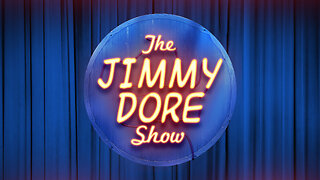 LIVE
LIVE
The Jimmy Dore Show
2 hours agoJohn Bolton Staring At LIFE IN PRISON! Kash Patel Pushes PURE BS Line About Kirk Assassination!
8,597 watching -
 LIVE
LIVE
Nerdrotic
3 hours ago $10.05 earnedRacist Academics Attack Tolkien | Hollywood to Strike AGAIN? | AI Doomsday - Friday Night Tights 376
2,547 watching -

Dr Disrespect
10 hours ago🔴LIVE - DR DISRESPECT - ARC RAIDERS - THE ULTRA EXTRACTION GAME
143K9 -
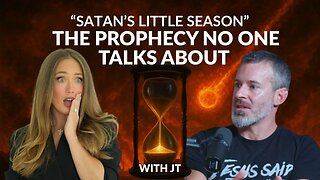 27:49
27:49
Robbi On The Record
21 hours ago $5.34 earnedRevelation, the End Times, and Satan’s Little Season part II - ft JT
25K6 -
 54:37
54:37
HotZone
4 days ago $0.95 earnedTen Hostages Missing! Will Hamas Keep Its Word?
27.1K4 -
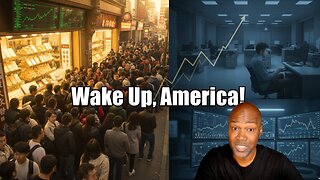 8:05
8:05
Rethinking the Dollar
8 hours agoFiat’s Endgame? Gold & Silver Lines Don't Lie
14.7K6 -
 LIVE
LIVE
LFA TV
23 hours agoLIVE & BREAKING NEWS! | FRIDAY 10/17/25
954 watching -
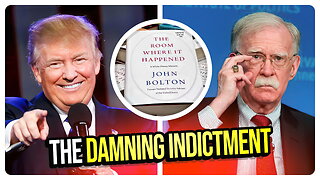 1:13:16
1:13:16
vivafrei
5 hours agoJohn Bolton is a DUMB CRIMINAL (Allegedly) - Trans Madness in Loudoun Country! Tampon Tim AND MORE!
89K40 -
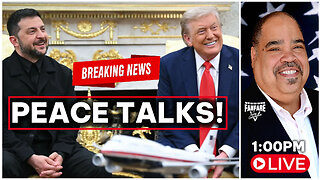 2:45:30
2:45:30
Barry Cunningham
17 hours agoBREAKING NEWS! PRESIDENT TRUMP MEETS WITH UKRAINE PRESIDENT ZELENSKY!
69K28 -
![MAHA News [10.17] Fertility Crisis, Redoing Vax Schedule, Psychiatry Corruption, Vegan vs Carnivore](https://1a-1791.com/video/fwe2/78/s8/1/Q/v/s/r/Qvsrz.0kob-small-MAHA-News-10.17.jpg) 1:19:44
1:19:44
Badlands Media
16 hours agoMAHA News [10.17] Fertility Crisis, Redoing Vax Schedule, Psychiatry Corruption, Vegan vs Carnivore
29K3